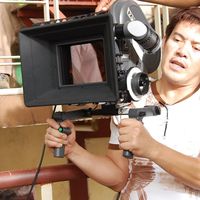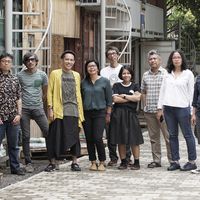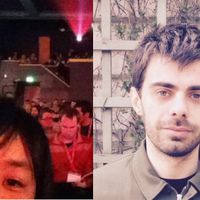A Conversation with Pen-Ek Ratanaruang, Director of Last Life in the Universe
 By Aditya Assarat, a Thai filmmaker
By Aditya Assarat, a Thai filmmakerAA: Sorry I have to start with a question you've been asked a thousand times but how did the idea for Last Life come about?
PR: After 69 <Pen-ek's second film>, I wrote the script for Last Life but at that time the main character was still Thai. He was trying to kill himself but could never succeed because stuff kept popping up to get in his way. So finally he's getting ready to throw himself off the bridge when across from him on the other side some girl beats him to it. He meets the dead girl's sister and that was how the story began. The original script was much more of a straight black comedy but then after I took a look at it, it was so similar to 69 and I didn't want to repeat something I just did. So I ended up throwing it in a drawer and went off to make Monrak Transistor instead. Then a year later, Wouter (Wouter Barendrecht, producer of Last Life ) proposed a project working with Asano (Tadanobu Asano) and Doyle (Chris Doyle). All three of us knew each other from film festivals and admired each other's work so it was a good opportunity. I didn't have anything else at the time, so I went back and pulled the old script from the drawer. I still wasn't happy with it so I asked Koon (Prabda Yoon, co-script writer of Last Life ) to rewrite it. I sat with him in this same Starbucks for three hours and told him the whole story. And he went off and rewrote it.
AA: I'm surprised that the main character was originally Thai. Japanese are much fonder of killing themselves.
PR: Yeah, it did seem a better fit in the end with a Japanese guy in the story.
AA: I've seen the film three times and now I start to notice all the little character details. Like how the guy pulls chopsticks from his pocket to eat fried rice and then finishes every last grain of rice on his plate. And how that contrasts with the girl, who lives in a complete mess. From your first film onwards, I've noticed how you often portray Thais as chaotic, emotional, unreasonable and borderline bonkers. Are Thais really this way?
PR: The people around me are. The thing is that when I make a film, I don't think consciously of these ideas of nationalities and religion, I just treat people as people. Maybe because I have no formal training in film, I always have to start with aspects of myself or of people around me. Maybe my thinking is chaotic.
AA: I sometimes get the same impression of Thais and wonder if this is because I've gone to study abroad and so start to look at Thais from a different perspective. Maybe for you too?
PR: I'm not really sure but I know the longer I'm here, the more I appreciate the chaos of us Thais. I think it's a blessing. Like we have bad traffic but nobody goes out to protest, they just buy a pot so they can piss in the car. I think Thais make much more sense of life than others do. Maybe we can't intellectualize it but I think we're very intuitive about life. Like when we shoot a movie abroad you ask the people to set up the dolly track and they set it up. In Thailand you ask them and they go and set it up but first they go and kick the lighting guy in the ass for laughs. The more I'm here the more I appreciate this aspect of life.
AA: I like the end where the guy comes back to his home and kicks over his neat pile of books. Are the Japanese really so different from us?
PR: Very. When I shot the ending in Osaka the production team wanted to know every last detail of the whole shoot. I didn't have a clue what I was going to shoot the next day and that doesn't work well over there. Even now when I go to Japan, they call me up two months before panicking that I haven't gotten my visa. It takes four days to get the visa. Why are you panicking about it? Relax. The Japanese are such nice, polite people. Asano would be giving me presents all the time during the shoot.
AA: Watching the film at Sundance, some of the audience were thrown off at the end when the black comedy yakuza hitmen show up.
PR: Because the style changes?
AA: I think they felt like that was part of a different movie but for me that seemed to be the meeting point between the old Pen-ek and the new Pen-ek.
PR: Ever since the script stage, the story was broken up into three parts. The first and third part are very much 'movies', storytelling. But the middle section is much more I don't know, real or surreal, very much like a documentary. That part required almost no direction. The chemistry between the two characters had been established so whatever they decided to do, I just went along with it. I didn't object, didn't manipulate.
AA: Is Last Life a turning point for you?
PR: Yes. In my first three films I was practicing how to tell a story. My training comes from commercials and looking back the aspect of my first films that I dislike is that they are all too concerned with plot and are way too obvious. When you want a laugh you do this, when you want a tear you do that, it's all too obvious. And for me, I think I blame that on my commercial training, where you're supposed to be clear and obvious.
AA: But I don't look at it as blame. There's nothing wrong with it. I think it represents you at that period of time.
PR: No, no, it's not wrong of course. But I'm at the point now where I don't want to do that anymore. I think I'm now more confident in my abilities and I want to try something a bit different - a film with more delicate emotions, more delicate feelings, without being hung up on plot logic and story logic. In many ways this was a perfect opportunity to try something new, especially working with Doyle and Asano. I mean, whether I wanted to or not, I would have had to change anyway to accommodate these great collaborators who themselves are going to bring something to the table. The truth is that the first cut of the film was painfully boring and pretentious but with some patience we searched around and finally found a rhythm that worked for the film.
AA: One aspect of the film that I personally like is the fact that it represents a modern view of life in Bangkok. Thai characters speak English and Japanese, Japanese characters speak English and Thai. I think it's an accurate reflection of our city as it is today.
PR: All the people around me are like this. I'm one who believes that our world isn't split up by passport, its split up by mentality and taste. I'm sure if you screened Last Life in Somalia, you'd find an audience there who really connected with the movie. And these Somalis, if you hung out with them, I'm sure they listen to the same music I do, read the same books I do - in the end this world is split up and united not by nationality but by mentality.
AA: I often think that I'm not fully Thai or American but belong to a cosmopolitan culture. Maybe that's a different way of saying the same thing.
PR: Yes, right. And the thing with the mix of languages in Last Life is that I think language is just a tool. It's not all that important on its own. I don't admire people who know all the languages, I admire a person who's witty, and that comes from inside. The people I like have a certain sense of humor, a certain wit, and that's a connection by mentality.
AA: Some people have said that Last Life is not even a Thai movie. The main character is Japanese, not much Thai is spoken and the funding for the film is international. But I think it's very Thai, it's a cosmopolitan Thai.
PR: I get accused all the time of not making "Thai" films.
AA: But what is a "Thai" film? I don't think you can say that a "Thai" film has to have this and this and this and people speaking Thai 95% of the time. I think Last Life reflects Thailand now.
PR: It also reflects me now. I don't know how to make any other type of film, I can only make something personal, if it wasn't film, it would be in some other medium.
AA: The interesting case of Last Life is that not only does it reflect a mix of nationalities creatively but also financially. Do you think this will be the way less commercial filmmakers will have to finance their films in the future? Rely on the West? Or to put it another way, do you think we have a market to financially support our own less commercial films?
PR: No, we don't have that at all. My films and Joe's films (Apichatpong Weerasethakul, director of Blissfully Yours ) rely almost entirely on foreign sales. I think there will be more co-productions in the future, but to answer the question is the West really interested in Thailand, the answer's no. It's all hype. The films that I make, that Joe makes, in the end they are art-house, they are very marginal. And thus, they don't reflect the reality of our own industry. Just the same, the success of Hou-Hsiao-Hsien and Tsai Ming-Liang doesn't reflect the reality of the Taiwanese industry. Their success is so out of the mainstream, the West is interested in them, or in me or in Joe individually, but in the end they couldn't give a damn what country we're from. It just happens these guys came up the same time from the same country, so it looks like a movement, but really it exists on an individual level. So I believe you're only as good as your last film.
AA: Just like the Hollywood saying.
PR: The structure of a co-production allows these kinds of films to exist, a more personal film with a personal voice. It may be new in Asia, but in Europe its been going on forever. If you look at the credits on European movies, the money is coming from all over the continent.
AA: There's a lot of talk in recent years about doing the same thing in Asia, the so-called Pan-Asian co-production.
PR: Well, you have to look at it in two ways. One is finance, and here its like anywhere, the package you're presenting - the script, the actors, the director - has to be something that sells in the end. Because in the end, film is like shampoo, people have to want to buy it and use it and get something out of it. It needs to be advertised, hyped up, so if the whole package works, then they'll do it. But the more interesting thing about co-productions for me is the sharing of resources. I could continue to make small movies in Thailand and not have to wait for a co-production to come together, but I want to be able to share resources, share creativity in the region. Like Chris shooting Last Life , you can see it plain as day the importance of his contribution. The film would not exist in its present form if not for him, and if not for Asano, and these are resources that are only possible in a larger co-production structure.
AA: I think that you are certainly one of the most interesting filmmakers working in Thailand now, and yet its no secret that you are under appreciated by the local audience, some who never get a chance to see your films because they don't stay in the theaters long enough.
PR: When I was first starting out, I used to envy Woody Allen's career, always shooting a new movie every year, year after year, it seemed very satisfying. But now, movies are not as important anymore.
AA: To you or in general?
PR: In general, in the world. There are so many films out there. There are going to be three types - masterpieces, good films, and crappy films. So if you make a film, its going to fall into one of these three categories. And if you don't make your film, its not a big deal, because there are going to still be thousands of other films out there for people to choose from. In Venezuela, as we speak, there's some crew shooting a film right now. And yet, when I make a film now, though I know its just another bottle of shampoo, while making it, I still approach it as an art. It still must mean something to me at the moment. It's hard work and in the end, you can only do it if you care about the film you're making.
AA: What do you think of the present Thai film industry?
PR: Well, a lot of films are going to go bust. It's the same in every industry, film or real estate or what not.
AA: So we're in a film bubble economy?
PR: Yes. It's like real estate. The craze is pushing everything out of proportion. People are calling this the golden age of Thai film and its bullshit. A few years ago people would call me up to give me money to make films and I would ask them, "well what do you do?" and they would be like the owner of a sausage factory. And why would they want to make films? They see the big films that make money but they don't hear of the other hundred that lose money. So first I tell them well you're calling the wrong guy. Go do some research first. But I never take their money because they don't have any idea what they're getting in to. That's not business - it's just gambling. They're throwing money at one racehorse and wait to see if it hits. And I think that's very destructive for the industry as a whole.
AA: Most of our films lose money. How do we fix the system? How do we improve our industry?
PR: Easy. But like everything else in Thailand, nobody will be able to do it. If you look at our industry, every position, from directors to actors all the way down to grips and coffee boys and everybody, we only have the personnel to make 10 films a year <in 2003 Thailand produced approximately 50 feature films>. If we take these people and make just 10 films a year, they'll be of a certain quality, and maybe three or four will be outstanding. But the standard will improve, commercially and artistically. Maybe if we're really greedy, we can squeeze 20 films out of these people. And I'm not only talking about the production people - I'm talking about the marketing, sales, all those people who must understand the business of movies. I think if we can stick to 10 quality films a year that should be our goal. But like anything, the success of the film industry doesn't rely only on the producers but also the audience. We first have to build up faith in our work. We have to build faith in the audience, that they can pay money for our products and not come out of the theater disappointed. The other problem is that we don't yet know who we are. Thai films cannot figure out their own identity yet.
AA: So what path should we take?
PR: I'm not sure either. But I always say films like Mekhong Full Moon Party or Fan Chan or Monrak , these films should not be labeled as outstanding films. If we really had a healthy industry, these three films would be considered standard films. Good films but not these wonderful achievements that people make them out to be. But currently these films are singled out for praise. Why? Not because the filmmakers are any better but because they put more care and thought and discipline to the job at hand. These are the kinds of commercial films that should be our base. The Thai industry doesn't need people like me or Joe, it needs people to make quality commercial films.
AA: Yes, I think that there will always be Thai art-house films. I don't think Pen-ek or Apichatpong will disappear because they represent a distinct voice. The danger lies in our commercial side because those films are competing directly with Hollywood movies.
PR: I have a secret hope that Thai films will go back to a time when we made 10 quality films a year. Hub-Ho-Hin is a company that's making quality commercial films. Yuthlert (Siphapark, February, Bup-pa-ra-tree ) is making quality commercial films. It's my hope that the Thai industry will have a few more of these people who know what they're doing, care about what they're doing. In the old days, in the 70s, we had a good period where people like Than Mui (Prince Chatrichalerm Yukol), Chert Songsri, Piek Poster, Manop Udomdej, were all making interesting auteur films - similar to the 70s in America. And then it disappeared. I hope that we can get back to that kind of environment again with movies like Mekhong, Fan Chan, Monrak as our standard films.
AA: And lastly, getting back to your new film, < Invisible Waves >, I'm wondering how you're going to continue to explore delicate emotions within the confines of the film noir genre.
PR: Yeah, I'm wondering that too.
Similar content
By Kerrine Goh
30 Apr 2004
By Kerrine Goh
12 Feb 2012
By Kerrine Goh
11 May 2016
By Kerrine Goh
22 Sep 2009




